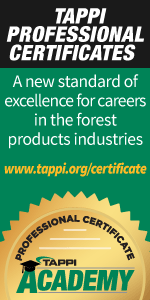| |
 · www.tappi.org
· www.tappi.org
· Subscribe
to Ahead of the Curve
· Newsletters
· Ahead
of the Curve archived issues
· Contact
the Editor

|
|
|
|
Congratulations, You're a Reliability Engineer: Now What?
Part 2: Maintenance Management Concepts
BY JAY SHELLOGG
So you spent four or five years becoming competent in your profession (or maybe even 25 to 30 years). You saw a job opening for a reliability engineer and it looked like a good fit, so you applied, interviewed, and got it—only to find out that your company does not really define what a reliability engineer is. Now what do you do?
Last week, we covered my 9 Principles of Reliability. If you've recently become a reliability engineer, Step 1 should be to learn these 9 principles and begin testing them to build your confidence that they are correct. Step 2 will be to learn these 11 Maintenance Management Concepts.

Maintenance Management Concepts
The following list discusses concepts of maintenance & reliability leadership that I have uncovered over the years. Like the listing of the 9 Principles, the concepts are presented in a very abbreviated format, but will give you a starting point. These concepts will be useful to you as a new reliability engineer—and for that matter, to anyone new to a mill leadership position.
A. How to motivate people
Treat everyone as an individual—people aren't cattle. What motivate one person may completely demotivate another. You need to spend time learning what makes a person tick and tailor any expectation to their likes and strengths.
B. Becoming an expert
Become an expert at only a few things—but know who the experts are at everything. No reasonable person should ever expect you to be an expert at everything related to maintenance & reliability (there will be those that do expect it, but they are unreasonable.) Spend time learning about the things that interest you and become an expert at a few of them. There is plenty of room for lots of experts in an organization.
C. How to effectively win an argument in a unionized environment
You win an argument by not arguing. In an organized labor environment, there can be no winners and losers: unless everyone is a winner, then everyone will be a loser. If a grievance goes to arbitration the only person who wins is the arbitrator. This holds true for non-unionized workplaces as well. Don't get caught up in petty squabbles over contract language even if you don't think it's petty.
Sometime you are forced into a conflict over the meaning of contract language because you simply can't reach consensus, or you are prevented from reaching consensus by other influences. In these cases, it is imperative that the other side understand your position, that you did not arrive at that position because of your emotions, and that you fully understand the opposing ideas.
D. Whose union contract is it?
Organized labor agreements belong as much to management as they do to the union; the union contract is the entire organization's agreement as to how work will be accomplished. I used to interact with a union rep who liked to say, "my contract says…" I would always reply, "it's my contract too, so what do we think our contract says?" In applying contract language, no matter what role you fill (hourly/salary, management/union), the goal is to satisfy the contract—not the individual or their role.
E. Never lie, but be sure you know what a lie is…
That sounds simple and easy, but make sure you understand other folk's concept of lying. One man's lie is another's lack of understanding. I work with a guy once who I told, "I will be out to see you sometime before lunch." Thing being what they were in the mill that day, I didn't make it out until 12:15 pm. (To his mind, this was "after lunch," because lunch starts at noon.) Showing up at 12:15 pm, within the "lunch hour," may not seem like a big deal, but this happened 19 years ago and I remember it like it happened today—showing up "after lunch" mattered quite a bit to this fellow, so (as stated in Concept A) I treated him differently from then on.
F. What do we do now?
When there is an equipment breakdown and a maintenance mechanic (millwright, pipefitter, welder, electrician…) asks you, "what do you want me to do?" ANSWER CAREFULLY. I have never had this question posed to me at face value. Everyone wants to demonstrate their knowledge and eagerness to help, but this question is about seeing if you will defer to the more knowledgeable person—the tradesman. Luckily, I have had the good fortune of learning from others.
I knew a young engineer once (I swear it was not me) who was posed this very question. This engineer thought the mechanics were genuinely "stuck" and didn't know what to do. So he dove in, and four hours later the machine was no closer to being back up and running than before. The engineer then asked, "I don't know what to do now—do y'all have any ideas?" In 45 min they were back to full production.
G. Handling an employee CRISIS!
Everyone's crisis is most important to them and needs resolution now. One person's sick child is just as distressing as the need to cut hay is to the part-time rancher, or having to miss part of an annual family fishing trip due to mill scheduling demands. You must not dismiss seemingly meaningless complaints. They are not meaningless to those that are complaining.
H. Key Performance Indicators (KPIs)
There is probably more time wasted annually in pursuit of KPIs than any other mill endeavor—especially if you are using them for monetary performance ratings. I have never known anyone who didn't "meet" their KPI targets when it came to personal enrichment. Besides—KPIs monitor systems, not people. The people can only do as well as the systems are designed. I am often asked to give lists of "good" or "best practice" KPIs. I always respond the same way: there aren't any. There may be a few KPIs that are fairly universal, but for the most part every organization is unique; therefore, each needs unique KPIs.
Still, here is how to figure out the best ones: they are the ones you track but don't tell anyone about. I knew a machine shop supervisor who tracked an array of KPIs—some in his head, some on paper—but they never appeared on any formal list. The truth was, he didn't even know that that's what he was doing; to his mind, he had merely built a tracking mechanism that told him how his shop was running. Those are the type of KPIs worth developing.
I. Zero-based budgeting
This is an effort that every organization I have worked with goes through. Great efforts begin three months before the budget submittal date—meetings with operations, engineering, managers, etc. Eventually, a number is determined for next year's maintenance budget. Maintenance presents its budget to the local management team, which says "You want HOW much?" You plead your case with facts, figures, and estimates, only to hear "cut it down to a 5 percent increase and I'll present that to corporate." But it doesn't end there. Once corporate is done with the budget you're lucky to get a 2 percent increase, meaning that you are not even going to overcome next year's inflation.
I knew a newly promoted maintenance superintendent once (again, not me) who went into great detail making a pitch for more spending. He needed a 20 percent increase. I told him that the best thing he could do was just inflate last year's budget by 5 percent, add in a few discretionary projects, and submit that. That way, when they told him "you can only have 1 percent," it would be much easier on him. He got a 2 percent increase in the overall budget. He was dejected and angry. I told him to look on the bright side: he'd gotten twice as much as I thought he would! Don't kill yourself worrying about an annual budget.
J. Who owns that pump…
…Operations or Maintenance? Neither—the shareholders own the pump. Every piece of mill equipment is operated to fulfill a function towards production output. Don't get caught up in departmental ownership of equipment. The Maintenance Department owns a big part of the maintenance function, but not 100 percent. The Maintenance Department also owns part of the safety, environmental, and quality functions. Every department has functional responsibilities related to every other department. Don't get caught in siloed thinking.
K. Hire more consultants to HELP!
Hiring consultants to tell you how to run your business? That is scary. Talk about letting the fox guard the hen house! I'm a consultant, and I have been since I graduated college. It just happened that the first part of my mill career was as an internal consultant and today I'm an external consultant. Consultant can be good at helping to identify problems and new techniques for solving them, but the organization is the expert. Listen to the ideas of those around you and follow Principle #4 (the people who work closest to failing equipment are the subject matter experts on that equipment.)
The maintenance budget is typically one of an organization's single largest expenditures. Maintenance typically employees the most people, but we have no formal educational system to teach the concepts of the business of maintenance and/or principles of reliability. Here we are in 2018, and we really manage maintenance no different than we did 40 years ago.
• As custodians of our shareholders' capital investments we are obligated to manage or assets wisely,
• as organizations we obligate ourselves to the welfare of our employees, and
• for our customers we promise to create value.
We cannot fulfill the expectations of our shareholders, employees, customers, and society as a whole without satisfying the underlying principles and concepts that govern the maintenance & reliability process. I hope the introduction to some of these concepts is helpful and may point to some past failing you have seen in your organization. Please feel free to contact me if you have any questions, I will enjoy hearing from you.
Author info:
Jay Shellogg spent the last 16 years of his career working at a large pulp and paper mill as a senior environmental engineer and maintenance/reliability superintendent. During that time he encountered many challenges; in his own words, "Some I overcame, and some I didn't." Contact him at jayshellogg@strategicmaint.com.
For a modest investment of $174, receive more than US$ 1000 in benefits in return.
Visit www.tappi.org/join for more details. |
|




